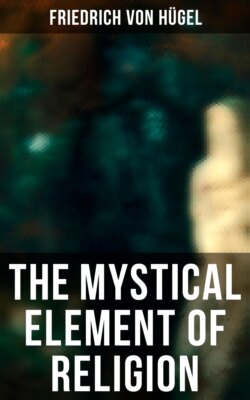Читать книгу The Mystical Element of Religion - Friedrich von Hügel - Страница 26
На сайте Литреса книга снята с продажи.
3. The “Petrine” attestations: their special message.
ОглавлениеThus the “Petrine” group gives us, as evidence for the observation and love of the external world: “Behold the birds of the air, how they sow not, neither harvest nor gather into barns”; “Study the lilies of the field how they grow, they toil not, neither do they spin: yet I say unto you, that not even Solomon in all his glory was arrayed as one of these”; “The seed sprouts and shoots up, whilst the man knows not; the earth beareth fruit of itself, first the stalk, then the ear, then the full grain in the ear”; “When now the fig-tree’s shoot grows tender and putteth forth leaves, you know that summer is nigh”; and, “When it is evening, you say: ‘It will be fair weather, for the sky is red.’ And in the morning: ‘It will be foul weather to-day, for the heaven is red and lowering.’”[9]
And as to reverence for tradition we get: “Think not that I have come to destroy the law or the prophets; I have come not to destroy but to fulfil.” And this respect extends to existing religious practices: “Beware,” He says, “lest you do your justice before men, to be seen by them,” but then describes the spirit in which they are to practice their “sedaka,” this “justice” which they are to do, with its three quite traditional divisions of alms-deeds, prayer, fasting, the three Eminent Good Works of Judaism. And again: “If thou offer thy gift upon the altar,” the doing so is in nowise criticised.[10]
Indeed there is no shrinking from the manifestation, on the part of the crowd, of new and even rude forms of trust in the visible and external: “A woman who had been suffering from an issue of blood during twelve years, … coming in the crowd behind Him, touched His garment, for she said: ‘If I but touch His garments I shall be saved.’ And straightway the issue of blood was dried up”; and the crowds generally “put the sick in the open places, and begged Him that they might but touch the hem of His garment; and such as touched it were healed”; and this “hem” consisted doubtless in the blue tassels, the Zizith, worn by every religious Jew at the four corners of his cloak.[11]
And the twelve Apostles, whom He sends out with special instructions, “going forth preached that men should repent, and went casting out many devils, and anointing many sick with oil and healing them.” Indeed there is, as the act preliminary to His public ministry, His baptism in the Jordan; and there is, as introductory to His Passion, the supremely solemn, visible, and audible act which crowns the Last Supper.[12]
But this same group of documents testifies also to a mystical, interior element in Our Lord’s temper and teaching. “Blessed are the poor in spirit, for theirs is the kingdom of heaven,” “Blessed are the clean of heart, for they shall see God,” are Beatitudes which cannot be far from the ipsissima verba of Our Lord. “In that hour Jesus answering said: ‘I confess to Thee, Father, Lord of Heaven and earth, that Thou hast hidden these things from the wise and prudent, and hast revealed them unto babes: yea, Father, for this hath been well-pleasing before Thee.’ … ‘Come unto Me, all ye that labour and are heavy laden, and I will refresh you. Take My yoke upon you and learn of Me, for I am meek and humble of heart, and you shall find refreshment for your souls: for My yoke is sweet and My burden is light.’” is deeply mystical passage doubtless expresses with a vivid exactitude the unique spiritual impression and renovation produced by Him within the souls of the first generations of His disciples. And the three Synoptists give us five times over the great fundamental mystical paradox: “If a man would come after Me, let him deny himself, and take up his cross and follow Me. For whosoever shall be determined to save his soul, shall lose it; but whosoever shall lose his soul for My sake, shall find it.” And the great law of interiority is recorded in St. Mark: “Listen unto Me, ye all, and understand: nothing that entereth from without into a man can defile him, but only the things that proceed from a man are the things that defile a man.”[13]
And we get in Mark the fundamental interior virtue of childlikeness, and the immanence of Christ in the childlike soul: “If anyone wish to be first, let him be the last of all men and all men’s servant.” “And taking a little child He placed it in the midst of them; and having embraced it, He said unto them: ‘Whosoever shall not receive the kingdom of God as a little child, shall not enter therein.’” “Suffer little children to come unto Me, for of such is the kingdom of heaven.”[14]
And the spirituality of the soul’s life in heaven, and the eternal Now of God, as the Living and Vivifying Present, are given in all three Synoptists: “In the Resurrection they neither marry nor are given in marriage, but are as the angels in heaven. But concerning the resurrection of the dead, have ye not read that which was spoken by God, saying, ‘I am the God of Abraham, and the God of Isaac, and the God of Jacob’? He is not the God of the dead but of the living.”[15]
